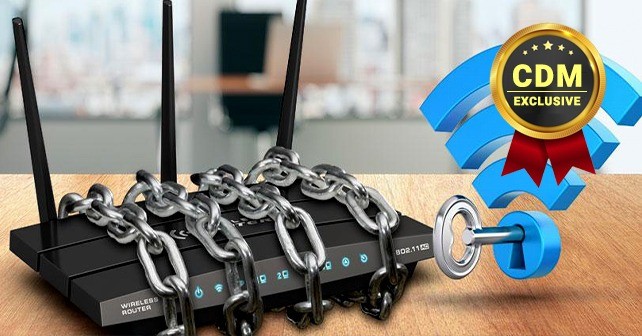by Lisa Barrie, Sub-editor at List Enthusiast
Wi-Fi internet or traditional wired internet?
Ask any person and he/she’ll go for the former. The ease-of-use, easier installation, and maintenance mean Wi-Fi network has fewer problems than a wired network.
But if there’s one area where wired networks are way ahead, it’s security. Wi-Fi networks are far easier to break-in than wired networks. Because of their wireless nature, any person in your signal range can attempt to connect to your Wi-Fi network.
An intruder can create many problems for you. Apart from increasing your internet bills, an unknown person can try to access your personal information. That’s why it’s important to secure your Wi-Fi network. Here are some of the best practices regarding Wi-Fi security.
Change your Router’s Admin Username
Although changing your default router’s admin username won’t make it stronger, not changing it may land you in trouble. If you don’t change it, a person can try to access your router’s admin panel.
Activate Encryption and Create a Strong Password
A weak or predictive password will only make it easier for others to connect to your network. This is the reason you need a hard-to-guess and long password. But according to this report, “123456” is still one of the most commonly used passwords in our world. You need a much better password than this.
For this purpose, you can use many online password generators to make sure your password is full of capital and small case letters, and special characters.
A password alone is not sufficient. You must set an encryption standard for your network. It’s because all Wi-Fi encryption standards are not equal. First, there was WEP (Wired Equivalent Privacy), it’s used on older routers, but very easy to crack and no one uses it nowadays.
WPA2-AES is widely used and most recommended encryption method nowadays but it’s not available on older routers. That’s why you may need to upgrade your router.
Turn off Guest Networks:
Guest networks are a convenient and easier way to give Wi-Fi access to your guests. What makes these guest networks vulnerable is that most people set a very easy password for these networks or worse, no password at all.
Many times, Wi-Fi signals range is more than your house’ boundaries and this way your neighbors and even strangers can connect to your guest network.
Although you can disable important tasks such as file sharing on guest networks, those unwanted users can still make you pay more for your internet bills by consuming more internet bandwidth.
Turn off WPS
WPS, also known as Wi-Fi Protected Setup, is a feature using which a device can connect to your router without any password authentication, even if you have encryption turned on.
All you need to do is pressing a WPS button on your router and connect your device with that router. That’s it.
There are many disadvantages of WPS, however, that easily outweighs its utility.
• If your router is placed in an unsecured area, anyone can press that WPS button and connect to your router.
• WPS-feature only has an 8-digit PIN and a hacker can easily run different techniques (like Brute force attack) to unlock it.
• WPS pins cannot be changed.
Considering these above points, it’s better to turn WPS off.
Reduce your router bandwidth
Sometimes we have a small house and a very long-range router like Asus AC88U. In this scenario, Wi-Fi signals can be broadcasted far more than your house’ boundaries.
One simple solution to deal with this problem is to turn on “Power-saving mode” on your router.
Have latest router firmware
A firmware works as the OS of a router and can have a security vulnerability unintentionally unfixed, just like any other software. These vulnerabilities are often dealt-with in newer updates
of that firmware. That’s why it’s good to check if you have an updated firmware version available.
Activate firewall
A firewall is a defense mechanism, in both software and hardware form, that keeps your internal network secured from malicious data coming from the internet or any other source. In simple terms, a firewall has one objective: Inspect network traffic and keep the network safe from any potential threat.
What many people don’t know is that their router has an internal firewall. Since all the internet data transfer between your devices and the web goes through your router, this firewall can make your whole network safe. If you don’t know how to activate your router’s internal firewall, go and read this article on how to do it.
Activate VPN
VPN, also called Virtual Private Network, acts as a medium between your home network and the web. After turning on a VPN, all the data transaction between your device and the web will be done via a VPN server.
A VPN gives you many advantages like staying anonymous over a public Wi-Fi or accessing a website/app with geographical restrictions.
Some other not-so-important Methods:
There are some other things you can do like Mac filtering, Disable DHCP or Hiding your SSID. But many experts criticize them that they are not going to give you as much security relief as you hope. That’s why I haven’t discussed them here. But you can try them out if you want.
About the Author
 Lisa is a Tech Blogger who specializes in writing networking related blog posts at List Enthusiast
Lisa is a Tech Blogger who specializes in writing networking related blog posts at List Enthusiast



